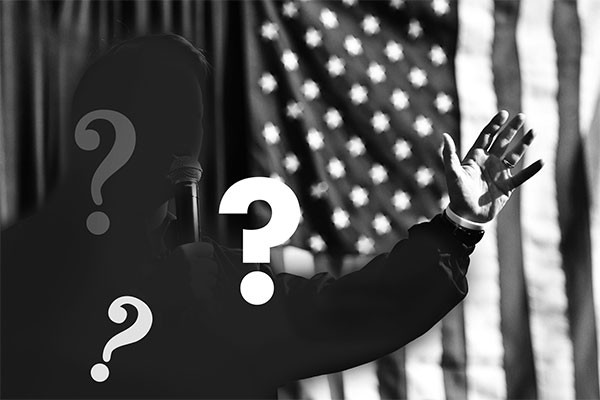The US presidential election is the longest, most confusing, infuriating experiment in the history of democracy. But at the same time, it is also far and away the most entertaining. Over the course of almost 20 months, candidates go from shaking hands in the cornfields of Iowa, to packed arenas nationwide, and if all goes well, they finish their journey with the keys to the Oval Office.
As Critic goes to print, we will have passed the halfway point in the primary process. While the race has certainly narrowed down and gained some clarity, it's far from over. In this handy guide, we attempt to explain the absolute clusterfuck that is the Presidential race.
Delegates
The most important part of the Primary process is that party nominees are not decided by votes, states won, or shouting matches. It all comes down to delegates, representatives from each state who convene at the party conventions in July to vote on who their nominee should be. On the Democratic side there are 4765 delegates up for grabs whereas the Republicans compete for 2472. Delegates are awarded to states based on a convoluted formula of population size, congressional districts, and the amount of people who voted for that party in the previous election, the effect of which is that for Democrats, the behemoth California carries 475 delegates, while tiny Vermont offers just 16. States may award their delegates any way they choose, usually proportionately, but some operate on a county-by-county basis, and several on the Republican side choose a winner-take-all system.
Super-Delegates
Also known as unpledged delegates, Super-Delegates are a group of important Democratic party personnel, usually current or former elected officials who, unlike pledged delegates who must nominate the candidate their state's voters chose, can vote for the candidate of their choosing. Some in the Bernie Sanders camp feared that party elites would use the system to override the will of the voters, should he win the pledged delegate count. This has never happened before, and most Super-Delegates simply vote for the apparent winner. Even Bill Clinton, who was a Super-Delegate in 2008, voted for Barack Obama as a show of support for the will of the voters.
Primaries and Caucuses
Where the action happens. Over the course of 5 months, the 50 states and territories will cast their votes, using one of these two methods. A Primary is simply an election day as we know it; polling booths are open all day, and people fill out a form and leave. Caucuses however, are an entirely different animal. Rather than vote at any time, voters must coalesce at a set time at an agreed location (usually a high school gym). Advocates give impassioned speeches in support of their candidate, then they literally go and stand in groups based on whom they support, and the winner is decided by a headcount. This is usually accompanied by campaign workers running around plying attendees with cookies and coffee in an attempt to get voters to move over to their side of the room. The net result of this is unverifiable, often inaccurate reporting of results, and very low voter turnout, which tends to aid candidates who appeal to the more ideologically pure wings of the party, like Bernie Sanders and Ted Cruz.
Open and Closed Contests
Because the parties in each state organise their own contests, there is absolutely no conformity in the way things are run. Some states require you to be a registered party member, others allow same-day registration, some include independents, while some allow anyone to vote, regardless of party loyalty, which has tended to benefit anti-establishment candidates Trump and Sanders. In 2008, Republican operatives exploited these rules in what was known as Operation Chaos, by encouraging conservative voters to switch party affiliations and vote in the Democratic primary for Hillary Clinton, who they saw as a weaker candidate than Barack Obama.
Contested Conventions
Normally, by the time the party conventions roll around there is a clear winner, and the actual nomination process is mostly formality. A contested convention, where no single candidate has a clear majority, has not happened in the past 60 years. But there's never been a candidate like Donald Trump. If no candidate has the 1237 delegates required to win nomination, delegates will vote over and over again until one arises. The third ballot will free most delegates from voting the way their state voted, and will be able to vote any way they choose. Both Ted Cruz and John Kasich will be hoping to win over party insiders and steal the nomination from Trump this way, although it is has also been speculated that a consensus candidate such as Mitt Romney or Paul Ryan could emerge victorious.







